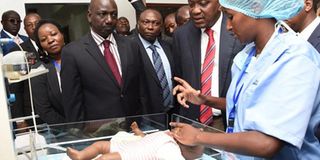Breaking News: At least 10 feared to have drowned in Makueni river
There’s no cost to counties in scheme, says Health CS

Nurse in-charge of Theatre at Machakos Level 5 Hospital Halima Adan demonstrates how labour equipment works when President Uhuru Kenyatta and Deputy President William Ruto visited the facility on May 28, 2015. PHOTO | DPPS
What you need to know:
- “If we had been leasing we would have obligations on the machines, but now we don’t,” Mr Macharia said.
- Mr Macharia admitted that the government does not have sufficient personnel to run the machines.
The government has rejected accusations that the Sh38 billion programme to equip 94 public hospitals with modern equipment is a waste of taxpayers’ money.
Health Cabinet Secretary James Macharia told the Sunday Nation on Saturday that the government was not even leasing the medical equipment but actually buying the services offered by use of those machines from the companies that manufacture them.
“If we had been leasing we would have obligations on the machines, but now we don’t,” Mr Macharia said.
The CS said that the government only invited bids from the original manufacturers in order to cut off the money that is normally made by middlemen and brokers.
“Some of them have subsidiaries and associates here in Kenya but it is the parent companies who signed the contracts. The obligation will remain with the original manufacturers so that they bear responsibilities to ensure that the machines are always up and running,” said Mr Macharia.
The CS said the government arrived at a decision to buy the services after a financial assessment was done by financial advisory services firm PKF who assessed that it would have cost $440 million to purchase the equipment as opposed to buying the services over seven years for $238 million.
In addition, government hospitals would not be laden with unserviceable equipment or obsolete technology in the coming years.
“In future, it would be cheaper to run this programme because the basic infrastructure is already in place,” he added.
TRAIN END USERS
In addition, the government would still be saddled with the costs of maintenance unlike in the current case where the manufacturers are maintaining them.
Mr Macharia admitted that the government does not have sufficient personnel to run the machines but said that it was up to the suppliers to train the end users.
“We would like the suppliers to train our people. That way they make sure that we get capacity to run the equipment. It should be running 24 hours,” he said.
He also said that part of the contract includes money that will be spent to create Internet connectivity so that doctors and other health workers can communicate to solve a problem.
“The Machakos-Kakamega connectivity was tested when we launched the other day. The President was able to witness as an X-ray was taken in Machakos and within seconds transmitted to Kakamega where a specialist gave his opinion about how the problem should be handled,” he said.
Mr Macharia said that the project would be fully funded by the national government to the tune of Sh4.5 billion annually.
“There is no cost to the counties. This is in addition to what they are already receiving in their county budgets,” he said.
The Director of Medical Services (DMS) Nicholas Muraguri told the Sunday Nation that counties had been consulted fully since last year.
“They are the ones who identified which hospitals would be put on the programme. In case they had already bought similar equipment, then they would identify another hospital,” said Dr Muraguri.
The DMS said that it was “unacceptable” that 50 years after Independence, the only fully functional ICUs in public hospitals are found at Kenyatta National Hospital, Mombasa Provincial General Hospital and Moi Teaching and Referral Hospital in Eldoret.
“In Machakos, there is a dialysis patient who can now be attended to while staying at home. Previously, he had rented a room in Kibera so that he could be able to reach KNH. Currently, we have 10,000 patients needing dialysis and our capacity is only 1,000. We want to change that. We want to change society as we build roads and skyscrapers,” said Dr Muraguri.





